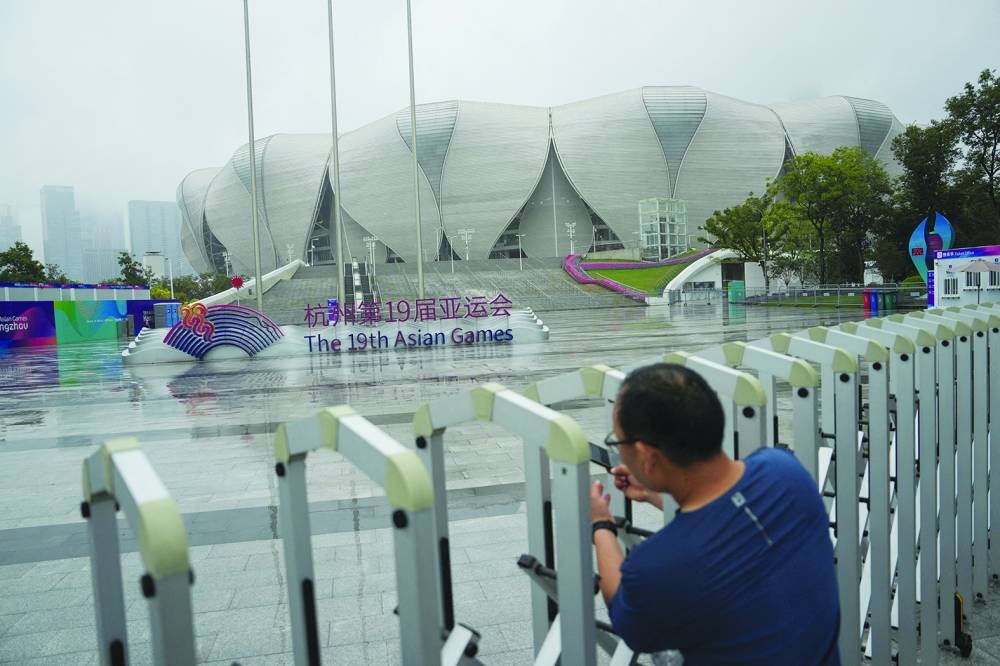The biggest Asian Games in history, boasting about 12,000 competitors – more than the Olympics – will open tomorrow in the Chinese city of Hangzhou after a year’s delay because of Covid. Athletes including world and Olympic champions will fight for medals in 40 sports from athletics, swimming and football to eSports and bridge.
Nine sports, among them boxing, break dancing and tennis, will serve as qualifiers for next year’s Paris Olympics. The Games were supposed to take place last September but were postponed because of China’s strict zero-Covid rules, before China’s ruling Communist Party abruptly abandoned the policy.
The 19th edition of the Games, which were first held in New Delhi in 1951, throws together competitors from 45 countries and territories across Asia and the Middle East. For China, which hosted the 2022 Winter Olympics in a Covid-secure “bubble” in Beijing, it is a chance to show off its organisational, sporting and technological prowess after the pandemic years cut the country off from the sporting world. “We have overcome a lot of challenges but we are now fully conditioned to hold a successful Games,” Chen Weiqiang, chief spokesperson for the Games, said. The Games will be staged at 54 venues – 14 newly constructed – mostly in Hangzhou but also extending to cities as far afield as Wenzhou, 300 kilometres (180 miles) south. The centrepiece is the “Big Lotus” Olympic stadium with a capacity of up to 80,000 where athletics and the opening and closing ceremonies will be staged.
President Xi Jinping will attend the opening ceremony and meet Syrian counterpart Bashar al-Assad there, along with other visiting leaders, Chinese state media says. Assad is making his first visit to ally China since the war erupted in Syria in 2011. Russian President Vladimir Putin likewise attended the opening ceremony of the Beijing Winter Olympics, along with Xi, and weeks later launched the invasion of Ukraine.
Hangzhou, a city of 12 million people an hour’s bullet train from Shanghai, is famed in China for its ancient temples, gardens and its beloved West Lake. It is also the unofficial home of China’s tech industry, notably the birth place of Jack Ma’s Alibaba. The Games will showcase some of the latest tech to come out of the city, including driverless buses, robot dogs and facial recognition.
Hosts China have topped the medals table at every Asian Games since 1982 and are expected to do so again by the time the curtain comes down on October 8. They should reign in swimming, with Qin Haiyang fresh from his heroics at the world championships, where he announced himself as the new undisputed breaststroke king. The 24-year-old swept all three men’s events and set a new world record in the 200m.
In athletics, another of the most closely watched sports, India’s Olympic and world champion Neeraj Chopra will defend his Asian Games javelin crown. His nearest competitor should be world silver medallist Arshad Nadeem from arch-rivals Pakistan and the countries are also on a collision course in cricket and hockey.
ESports, in what is seen as a step towards Olympic inclusion one day, will make its full Asian Games debut having been a demonstration sport five years ago. Lee Sang-hyeok, better known as “Faker”, has god-like status in League of Legends and will lead the South Korean charge at the futuristic-looking China Hangzhou Esports Centre.
There is an added incentive which has caused controversy in South Korea – winning gold will exempt them from having to do military service. A feature of the Asian Games is that it includes sports that are a little more quirky than the Olympics.
Xiangqi – also known as “Chinese chess” – the card game bridge and the ancient wrestling discipline of kurash are all on the menu. Although the Games officially open tomorrow, the sporting action began on Tuesday.
Sport
Biggest-ever Asian Games ready for liftoff in China
Games will be staged at 54 venues, mostly in Hangzhou but also extending to cities as far as Wenzhou

A general view of the Hangzhou Olympic Sports Centre Stadium in Zhejiang, China, the venue for the opening ceremony of the 19th Asian Games. (Reuters)
